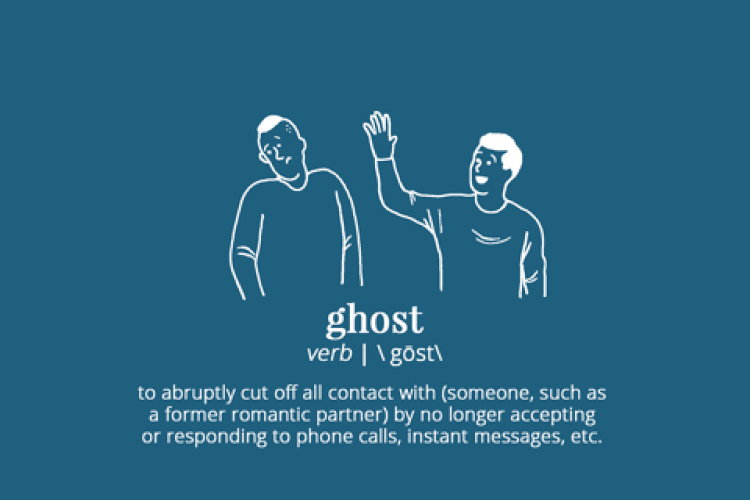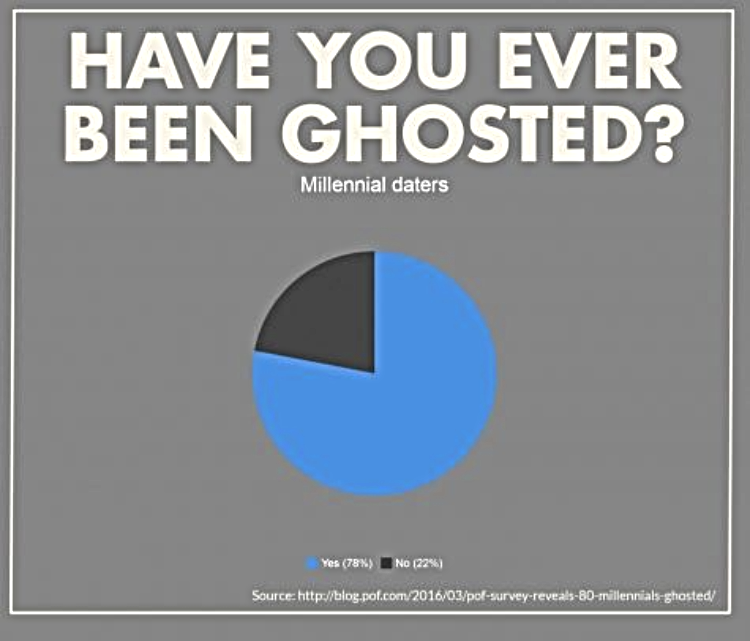Ghosting | Who Does It and Why They Do It
[perfectpullquote align=”full” bordertop=”false” cite=”” link=”” color=”#4AC1A8″ class=”” size=””]Ghosting: “a verb that refers to ending a romantic relationship by cutting off all contact and ignoring the former partner’s attempts to reach out.”[/perfectpullquote]
Being ghosted can be extremely hurtful. Although little empirical research has been conducted, the phenomenon is akin to ostracism. Social psychology has performed much research into ostracism, finding it to be detrimental to one’s mental well-being.

Ghosting and Ostracism
Ostracism is using the silent treatment on somebody. It differs from ghosting according to its outcome. Whereas ghosting is a method of ending a relationship, ostracism often occurs during a relationship, not necessarily resulting in a termination.
The overlap is the refusal to communicate with the other person. Ostracism is experienced as pain. It threatens fundamental human needs, such as belonging, self-esteem, control, and meaningful existence. It increases fear and sadness and is linked to interpersonal problems such as aggression.
Worse still, ostracism is thought to be a precipitating factor in school shootings, with most shooters experiencing it and rejection prior to the shooting.
In short, ostracism is no joke. It’s a powerful method of inflicting psychological trauma.
Research from the Journal of Personal and Social Relationships has analysed the mindsets underlying people who engage in Ghosting, providing important information for those wishing to detect and avoid potential ‘Ghosters’.

People have implicit theories that shape their thoughts and behaviours in romantic relationships. Within relationships, these theories have two dimensions; destiny and growth.
Now, destiny and growth are not two ends of a spectrum, but independent measures that overlap. A person high on the destiny measure isn’t necessarily low on the growth measure. However, people seem to be higher on one or the other.
Believing in Destiny
Destiny theorists have a more fixed mind-set. They believe in the idea of soulmates. Consequently, for them, a relationship is either going to work or it isn’t. Either their partner is their soulmate, or they’re not.
The length of their relationships is determined by the initial satisfaction and closeness with their partner. If they believe they are with their soulmate, then they experience satisfaction within the relationship.

During conflict, destiny theorists are more likely to use distancing as a coping mechanism. Furthermore, if things aren’t working out, they tend to focus on the negative details that manifest in their partner. In worst case scenarios, when their partner doesn’t fit their ideal, long-term relationships can become violent.
These relationships tend to end more than their growth-based counterparts. Additionally, destiny theorists are less likely to remain friends with their ex post breakup.
Believing in Growth
Conversely, growth theorists believe that relationships grow over time. They think relationships are malleable and can be improved upon with communication and by overcoming hurdles together.
These individuals engage in fewer one-night stands and date for longer periods of time than their counterparts. Growth theorists use relationship-maintenance coping strategies in times of strive. Furthermore, they are more likely to stay committed even when there is ongoing conflict.

During interpersonal issues, growth theorists don’t use their standards of an ideal partner to judge their partner. Furthermore, growth theorists are less likely to take responsibility for a break-up. As these individuals tend to put in emotional work, they are likely not solely responsible for a break-up.
Ghosting
Destiny theorists consistently thought that ghosting is an acceptable method of ending a relationship. They are more likely to terminate a relationship with ghosting at multiple stages in the relationship.
Destiny theorists admitted to having ghosted in the past, with the intention to potentially ghost again in the future.

As destiny theorists view problems as indicative of a poor relationship and don’t seek friendships with their exes, they may be less concerned with the potential pain they inflict with ghosting.
Interestingly, previous research has indicated that destiny theorists react more strongly to ostracism, lashing out in response. Despite this, they tend to employ ghosting more often. This may be due to cognitive dissonance.
Conversely, growth theorists view ghosting as a less acceptable method of relationship termination. Although, these individuals thought ghosting was more acceptable before physical intimacy had been established.
Growth theorists are less susceptible to ‘love-at-first-sight’, but rather conceptualise the relationship as romantic after an important marker, such as physical intimacy. Therefore, prior to this conceptualisation, ghosting appears as a more acceptable termination method.
Advice
When in the early stages of dating, it may be useful to gauge whether someone believes more in soulmates or in growth. Subtle questioning could provide key insights into an individual’s implicit relationship theories, hence avoid any potential ghosting.
[perfectpullquote align=”full” bordertop=”false” cite=”” link=”” color=”#4AC1A8″ class=”” size=””]Suggested Reading: Practical Psychology | How Narcissists Use Instagram[/perfectpullquote]
